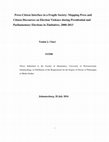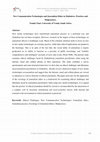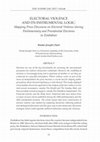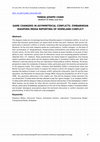Bible in Africa Studies by Tendai Chari

BiAS 15 / ERA 1, 2014
This volume was motivated by the realisation that AICs continue to be a significant player on Zim... more This volume was motivated by the realisation that AICs continue to be a significant player on Zimbabwe’s spiritual market. Members of predominantly Apostolic, but also Zionist, churches are highly visible in both rural and urban areas. Prophets from AICs are constantly in the news, alongside advertising their competence in urban areas. Thus it is high time to bring AICs being an important part of recent social reality in Zimbabwe back into academic focus.
BiAS 15 at the same time is ERA 1 which means that this volume opens a new sub-series to BiAS which is meant to explore religion in Africa in all its manifold manifestation, be it Christian or not.
The contributors:
Kudzai Biri | Tendai Chari | Vengesayi Chimininge | Ezra Chitando | Masiiwa Ragies Gunda | Francis Machingura | Molly Manyonganise | Richard S. Maposa | Tapiwa Praise Mapuranga | Pauline Mateveke | Robert Matikiti | Obert Bernard Mlambo | Taurai Ronald Mukahlera | Canisius Mwandayi | Lovemore Ndlovu | Munetsi Ruzivo | Fortune Sibanda | Elizabeth Vengeyi
Papers by Tendai Chari
Global transformations in media and communication research, Dec 31, 2023
Internet shutdowns have become a common tool through which undemocratic states manage information... more Internet shutdowns have become a common tool through which undemocratic states manage information flows globally, not least in Africa

Many African countries have been holding regular elections since the "Third Wave" of democratisat... more Many African countries have been holding regular elections since the "Third Wave" of democratisation which reintroduced multi-party politics on the African continent, but few of these elections meet the democratic litmus test, due to, among other factors, the prevalence of election violence. The press has been justifiably or unjustifiably indicted for these imbroglios on account of alleged transgressions linked to its overt or covert incitement to violence. In the ensuing political contestations, citizens bear the burden of diminished prospects of credible information occasioned by a highly politicised press. In the Southern African region, there is no better case to illustrate the entanglement of the press in electoral contestations than Zimbabwe. This study is a qualitative exploration of press and citizen discourses on election violence during the presidential and parliamentary elections held in Zimbabwe between 2000 and 2013. A Foucauldian discursive analytic approach was used to analyse the representation of election violence in two-state-owned and four privately-owned newspapers during presidential and parliamentary elections held over the specified period spanning thirteen years. The study also examined how these press discourses interrelate with citizen discourses. Empirical data were drawn from a corpus of archival textual data comprising hard news and feature articles published in The Herald, The Sunday Mail, The Zimbabwe Independent, The Financial Gazette, Newsday and the Daily News. In-depth interviews were conducted with purposively targeted journalists and editors from the selected newspapers. In addition, in-depthinterviews were held with twenty-one (21) regular newspaper readers who were also politically engaged citizens. The main observation was that press representation of election violence was marked by antagonistic discursive practices reflective of the rivulets of political and ideological bifurcation. Consequently, competing and politically expedient journalistic philosophies emerged. The state-owned press used a model of 'national interest' journalism while the privately-owned press preferred the 'human-rights' model which crystallized into an over-arching 'activist journalism'. This 'activist' journalistic approach found expression through an array of anti-democratic press discursive practices epitomised by selectivity, silence and salience, the consequence of which was that citizens were starved of credible and impartial information. This thesis argues that the anti-democratic discursive practices deployed by the press camps blunted the citizenry's critical engagement with the exact motivations, causes and manifestations of election violence. These anti-democratic discursive practices have a potential to engender a culture of political intolerance with long-term consequences that predispose society to political conflict rather than consensus building.

New media technologies have transformed journalism practice in a profound way and Zimbabwe has no... more New media technologies have transformed journalism practice in a profound way and Zimbabwe has not been exception. However, research on the impact of these technologies on journalism ethical is troublingly scant. Much of the scholarly attention tends to focus on uses of new media technologies in everyday practice, while their ethical implications are pushed to the backstage. This is in spite of the fact that, the social utility of journalism is largely predicated on its ability to function as a provider of public knowledge, and "truthful, comprehensive and intelligent" accounts of news and events (Ward 2008). The present study examines ethical challenges faced by Zimbabwean journalism practitioners when using the internet, email and cellular phones in their operations. The study combines a survey questionnaire and semi-structured interviews to elicit data on ethical challenges and dilemmas faced journalism practitioners in Zimbabwe.. Results reveal a dialectical impact of new media technologies on journalism and suggest that, the Internet, email and cellular phone are viewed as enhancers as well as obstacles to ethical journalism. The paper motivates for the application of the sociology of journalism ethics as a framework for examining ethical challenges and dilemmas faced by journalism practitioners when using new media technologies. It is argued that the practice of ethical journalism should be viewed as circumscribed by the interaction of a complex web of structural, institutional and socioeconomic factors, both internal and external to the environment in which journalism is practiced.

Journal of African elections, Jun 1, 2017
Elections are one of the key benchmarks for assessing the international perception of a nation's ... more Elections are one of the key benchmarks for assessing the international perception of a nation's democratic credentials. However, the credibility of elections is increasingly being tied to questions of whether or not they are conducted in a peaceful atmosphere. Where violence exists as part of the menu of manipulation the press becomes a crucial tool for shaping public perceptions about electoral legitimacy or lack thereof. This study employed a Foucauldian discursive approach to the analysis of election violence in two state-owned newspapers, namely The Herald and The Sunday Mail, and three privately-owned newspapers, namely The Zimbabwe Independent, The Financial Gazette, and the Daily News. Empirical data were drawn from a corpus of news stories published during the 2000 parliamentary and the 2002 presidential elections. The article argues that press construction of election violence was marked by competing discourses reflecting political and ideological bifurcation and this gave way to anti-democratic discursive strategies which could engender political intolerance among the citizenry.
Advances in African economic, social and political development, 2023

The diaspora media are increasingly becoming influential players in homeland conflicts, to such a... more The diaspora media are increasingly becoming influential players in homeland conflicts, to such an extent that domestic governments can ignore them at their own peril. However, their actual role, particularly in domestic conflicts is remains contentious with two perspectives dominating existing literature. On the one hand, diaspora media are constructed as "conflict mongers" on the basis of their accentuation of "disagreements, foregrounding confrontations and lending their airtime to forceful voices. On the other hand, they have been viewed as peace builders on account of their ability to shun "extremism, giving room for alternative voices and visualizing peaceful solutions" (Skjerdal 2012, 27). However, these assessments are mainly based on suppositions, thus leaving implicit questions about what role the diaspora media play in homeland conflicts and what their influence is and how exactly are they are implicated in these political conflicts. Moreover, this binary perspective masks the complexity of diaspora media, particularly given the diversity and dynamism of the diaspora media. This chapter combines Gadi Wolfsfeld (1991)'s transactional mode and Michel Foucault's Discourse theory to explore the extent to which the diaspora media sought to equalise the balance of power in an unequal conflict, pitting the ruling party, Zanu PF and the main opposition, the Movement for Democratic Change (MDC) during the presidential runoff of 27 June 2008. Key questions addressed in this chapter are: How did the diaspora media represent the runoff election? To what extent did they attempt to play the "game-changer" in an unequal conflict? To what extent did the diaspora media accentuate external intervention in the Zimbabwean conflict? What lessons can be drawn for other African countries and beyond? The chapter presents an African, particularly Zimbabwean perspective on the role of the diaspora media in homeland affairs and broader ideological assumptions about the dominant discourses in conflict resolution and peacebuilding, of which the media are a key propagator.
Routledge eBooks, Jun 16, 2022

Chari examines discursive constructions of negotiations for a Government of National Unity in the... more Chari examines discursive constructions of negotiations for a Government of National Unity in the Zimbabwean diaspora media. Empirical data were drawn from a corpus of purposively sampled archival news stories published in Zimbabwean diaspora media outlets. The selected stories were published between 1 July and 12 September 2008. Chari contends that three discourses dominated the Zimbabwean media’s construction of the negotiations; namely, cynicism, no compromise and retributive justice discourse. These discourses mirror the Zimbabwean diaspora media’s constructed identity as products of forced migration, hence their reporting was oriented towards the escalation of conflict rather than conflict cessation. This positions the Zimbabwean diaspora media as conflict entrepreneurs rather than peace-builders. The study opens new pathways for understanding the role of the diaspora media in homeland conflicts.
IGI Global eBooks, Sep 16, 2014

Indilinga: African Journal of Indigenous Knowledge Systems, 2016
The mass media have played a significant role in shaping public opinion and perceptions about cli... more The mass media have played a significant role in shaping public opinion and perceptions about climate change. However, the phenomenon is still misunderstood, particularly in Africa where an information lacuna about the science of climate change persists, owing to among other factors, socio-cultural, economic and structural factors. As a consequence, citizen engagement with climate change discourse is very minimal and awareness about its causes and risks remain marginal. Numerous studies have questioned the efficacy and professional ethos of the mass media in communicating climate change, with some scholars accusing the mass media of mis-communicating, mis-reporting, distortions or falsification (Henderson-Sellers 1998; Boykoff and Boykoff 2004; Antilla 2005) of climate change issues, thereby imposing barriers on the audience's ability to understand climate change. This article is a theoretical treatise on the efficacy of big media such as television, radio and newspapers in communicating climate change in the African context. The article contributes to the existing body of knowledge and debates on climate change through an interrogation of the epistemological assumptions embedded in contemporary climate change communication strategies epitomized by the obsession with 'big media' and how such assumptions militate against consensual participation and understanding of the climate change discourse. It advocates the integration of mass media with indigenous media in generating public engagement on climate change issues. The article uses biomass burning as a lens for canvassing the incorporation of indigenous media in existing strategies of communicating climate change. It argues that the communication of climate change science in Africa could be better served by integrating indigenous communication systems that embrace existing local knowledge in order to create more awareness and knowledge about climate change issues in Africa. As a component of indigenous Knowledge Systems (/KS), indigenous communication media have distinct characteristics that resonate with the lived experiences of the majority of African people and therefore more effective in communicating complex issues such as climate change.
Routledge eBooks, Sep 27, 2022
Routledge eBooks, Sep 27, 2022
Media, Diaspora and Conflict, 2017
Conflict appeals to the media because of its news values’ attributes. But while there is a wealth... more Conflict appeals to the media because of its news values’ attributes. But while there is a wealth of literature on representation and mediation of conflicts from the perspectives of mainstream media, there is a paucity of research from the perspectives of diasporic media. Therefore, the various chapters in this anthology provide systematically, analytically and empirically grounded approaches to understanding the representation and mediation of conflicts by the diasporic media and their consequences for conflict resolution. By so doing, this anthology aims to provoke debates and further research into the roles of diasporic media in escalating and deescalating conflict at Home and the challenges they pose to their professional values and to their engagement with diaspora audiences.

African Football, Identity Politics and Global Media Narratives
The 2010 Soccer World Cup was anticipated to bring economic development and financial opportuniti... more The 2010 Soccer World Cup was anticipated to bring economic development and financial opportunities to South Africa and the African continent. Infrastructural development was generally anticipated, but it was in the ability by African companies and entrepreneurs to win lucrative deals that the success of the soccer showcase would be measured locally. This study traces the media reportage of business or economic success, or lack thereof, associated with the 2010 World Cup. The research largely draws from archival press reports of selected newspapers from South Africa, Zimbabwe and Europe and/or the USA that represented the take up of opportunities by African business people. Critical Discourse Analysis was applied to ascertain the knowledge-power dynamics in the representation and investigate whether Africa continues to generate negative stories of failure and ineptitude, even when opportunities are placed before it. Stories on the success or lack thereof of Africans in exploiting the opportunities presented by the soccer showcase inevitably have implications on the continent’s identity. The historical negative and demeaning stereotypical images about Africa will be imploded, sustained or perpetuated in relationship to the stories on success or failure.
Journal of Literary Studies, Oct 2, 2017
het om hul gekonstrueerde diskoers oor Mandela se nalatenskap aan sport te projekteer-'n lens wat... more het om hul gekonstrueerde diskoers oor Mandela se nalatenskap aan sport te projekteer-'n lens wat sy individuele bydrae beklemtoon het, eerder as kollektiewe pogings om die Wêreldbeker na Suid-Afrika en die Afrika-kontinent te bring. Die outeur beweer dat Mandela se nalatenskap aan sport onlosmaaklik deel is van sy groter erflating aan die politiek en die samelewing, wat daarop dui dat, sover dit postkoloniale gemeenskappe betref, hierdie twee terreine deurweef is.
Asian journal of sport history & culture, Sep 2, 2022











Uploads
Bible in Africa Studies by Tendai Chari
BiAS 15 at the same time is ERA 1 which means that this volume opens a new sub-series to BiAS which is meant to explore religion in Africa in all its manifold manifestation, be it Christian or not.
The contributors:
Kudzai Biri | Tendai Chari | Vengesayi Chimininge | Ezra Chitando | Masiiwa Ragies Gunda | Francis Machingura | Molly Manyonganise | Richard S. Maposa | Tapiwa Praise Mapuranga | Pauline Mateveke | Robert Matikiti | Obert Bernard Mlambo | Taurai Ronald Mukahlera | Canisius Mwandayi | Lovemore Ndlovu | Munetsi Ruzivo | Fortune Sibanda | Elizabeth Vengeyi
Papers by Tendai Chari
BiAS 15 at the same time is ERA 1 which means that this volume opens a new sub-series to BiAS which is meant to explore religion in Africa in all its manifold manifestation, be it Christian or not.
The contributors:
Kudzai Biri | Tendai Chari | Vengesayi Chimininge | Ezra Chitando | Masiiwa Ragies Gunda | Francis Machingura | Molly Manyonganise | Richard S. Maposa | Tapiwa Praise Mapuranga | Pauline Mateveke | Robert Matikiti | Obert Bernard Mlambo | Taurai Ronald Mukahlera | Canisius Mwandayi | Lovemore Ndlovu | Munetsi Ruzivo | Fortune Sibanda | Elizabeth Vengeyi